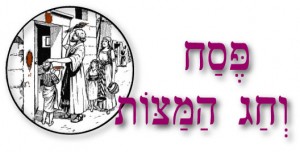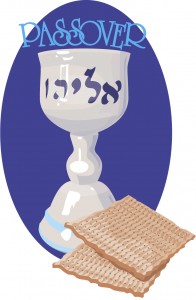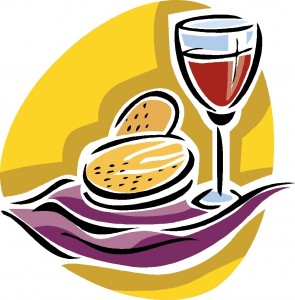This video explains the relevance of the ancient Passover ritual to the redeemed believer in Yesua of the the 21st century, and why celebrating Passover brings a special blessing. A free downloadable study guide for this video is available at http://hoshanarabbah.org/blog/2013/03/12/the-passover-and-the-seder/.
Tag Archives: Passover
When do we celebrate Passover?
Passover is just around the corner — in fact, on Saturday, April 4. We’ll be starting our Passover seder at about 6 PM on Saturday.
There is some confusion about when to celebrate the Passover, which is why I wrote the following short article. Natan
Passover occurs on the fourteenth day of the first month at twilight (Lev 23:5; Num 9:3, 5, 11). Twilight is the Hebrew word erev meaning “evening, night, sunset” according to all the main Hebrew lexicons. The root word for erev is arab meaning “to become evening, grow dark or to spend the evening, do at evening.”
Which twilight time did the Israelites keep Passover? The twilight of the thirteenth day going into the fourteenth day, or the twilight of the fourteenth day going into the fifteenth day? Let’s examine the Scriptures for the answer.
YHVH commanded the Israelites to kill the Passover lamb at twilight (Exod 12:6) and then to put its blood on their doorposts (Exod 12:7). After that, they were to roast and eat the lamb in that same evening (Exod 12:8). The word evening in Hebrew is layil meaning “night as opposed to day.” They were to eat the lamb that evening “with a belt on your waist, your sandals on your feet, and your staff in your hand…in haste” (Exod 12:11). This was the same night that Elohim struck all the firstborn of Egypt, but passed over all the houses of the Israelites that had blood on the doorposts (Exod 12:12–14).
One thing is certain. Passover occurs on the fourteenth day of the first month of the Continue reading
Passover Seder Communion Service
Prepping for Passover and the Feast of Unleavened Bread
It’s that time of year again! Passover will be on the evening of Monday, April 14, and the first high holy day (it’s a Sabbath day of rest) of the Feast of Unleavened Bread will be on Tuesday, April 15 with the last day of Unleavened Bread (also a high holy day Sabbath) will be on Monday, April 21.
To help you to understand the significance of these days and to learn how to properly celebrate them, here are some links for with further instructions on this.
Below is a link to the Hoshana Rabbah website where you’ll find practical instructions on celebrating Passover and the Feast of Unleavened Bread. Included is a free downloadable Passover haggadah and tips on how to deleaven your house among other things.
http://hoshanarabbah.org/pesach.html
The following link will take you to a number of teaching articles that I’ve written on Passover and the Feast of Unleavened Bread. After you’ve read them, you’ll have an excellent understanding about the historical and future prophetic implications of these special observances as well as how they relate to the believer’s life presently.
http://hoshanarabbah.org/teaching.html#feast
This is a link to the Hoshana Rabbah YouTube channel. Scroll down through the 120 some videos and you’ll find a number of video teachings on Passover and Unleavened Bread.
https://www.youtube.com/user/HoshanaRabbah?feature=mhee
Enjoy getting your mind and heart ready to walk out these divine, appointed times of YHVH when he meets with his people in a special way!
Are you ready for Passover? Here’s some help.
Passover is coming soon. Now is the time to prepare to meet Yeshua at Passover. Here are some points to consider that will help get you ready for Passover.
- As the children of Israel applied the lamb’s blood to the door posts and lintels of their house, so we must apply the sin-cleansing and Satan-defeating blood of Yeshua afresh to our lives (i.e., to your thoughts as represented by the door lintel and actions and to our hands as represented by the door posts).
- In ancient Israel, YHVH judged all those who weren’t under the blood of the lamb. Unrepented sin has a death claim on us all. To the degree that one has sin in their life is the degree that the spirit of death as a hold on one’s life. Now is the time to repent of sin by confessing it and seeking Elohim’s forgiveness under the blood of Yeshua.
- Pass on to the next generation by telling your children the Passover story. Explain how the Israelites were enslaved in Egypt (the world) to Pharaoh (Satan), and how YHVH delivered them from the judgment of the destroyer (YHVH’s judgment against sin) because they put the blood of the lamb on their doorposts (a picture of Yeshua’s sin-atoning death on the cross).
- Prepare your heart and mind to obey YHVH by keeping his appointed times of Passover and Unleavened Bread. Are we going to obey his commands pertaining to these observances? How much do we love him (John 14:15)? How much do we want to know him (1 John 2:6–7)? Celebrating these feasts help us to love and to know him better. Continue reading
The Life of Yeshua in the Bread and Wine
1 Corinthians 11:23, This is my body. We are sanctified through the offering of the body of Yeshua (Heb 10:10). When we eat the bread of communion, we are “eating” Yeshua who is the incarnate Word of Elohim (John 1:14). We are announcing that Yeshua is the spiritual bread of life from heaven that leads to eternal life (John 6:48–51), and we are announcing our desire to live by the totality of his Word (Matt 4:4).
The bread symbolizing the body of Yeshua was unleavened, which is a picture of Yeshua’s sinless life. By eating this bread, we declare our faith in his sinless life by which he was able to pay for our sins. We also declare our identification with his sinlessness as an example for us to follow.
Yeshua took the unleavened bread and broke it signifying our deliverance from our sin nature by the breaking or death of his sinless body. The unleavened bread broken in the Lord’s supper speaks of our deliverance from the power of sin by the death of our old man. The rite of baptism is a picture of this (Rom 6:4–13). This paves the way for us to live a sanctified (sin-free) life.
We become unleavened or sinless (known as sanctification) because Yeshua our Passover Lamb was sacrificed for us (1 Cor 5:7). Continue reading





